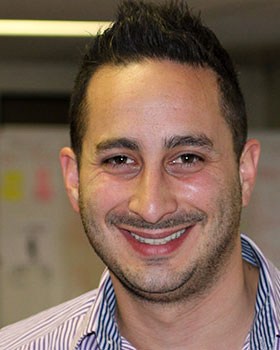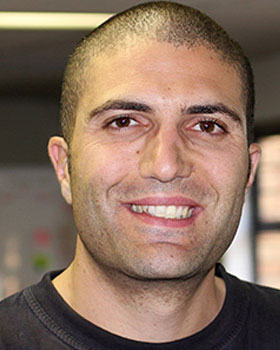
Synaq’s nondescript offices near the Sandton CBD feel laid back and comfortable. A large blackboard near the entrance has scribbles all over it. These offices check all the boxes of a start-up, but this business is far too big, and a few years too old, to fall into the start-up category.
It all started a few years after high school for founders Yossi Hasson and David Jacobson, now both 32. It was 2004 when the pair caught up over a cup of coffee. The conversation turned to the anti-spam solution Jacobson, a software “hacker”, had developed on open-source software.
Jacobson was working at Imperial Online, a data centre and IT hosting company. It was there that he developed an anti-spam e-mail platform. He knew then that he was onto something big.
After more discussion, Jacobson and Hasson realised there was a business opportunity beyond just anti-spam software. They decided there was a market for managed Linux services in South African business.
In 2004, offering anti-spam solutions and venturing into Linux services, the two fresh-faced youngsters — they were 22 at the time — started Synaq.

“We knew Linux was going to take over the world and we knew there weren’t any strong professional managed Linux service providers in the country,” says Hasson.
At first, Jacobson did not care much for the idea of starting a business. All he really wanted to do was build great software using the vast array of open-source solutions at his disposal. It was not until a conversation with his brother, Dean, that Jacobson warmed to the idea.
Dean Jacobson went on to become one of Synaq’s early investors, along with two unnamed angel investors.
The company was launched with just R900 000 in funding.
“I believe we were the first provider in South Africa to offer a true cloud-based e-mail security platform,” says Jacobson. “It was long before ‘cloud’ became a buzzword.”
The pair wrote a seven-page business plan. “The broader vision was to be the managed services provider in the Linux space,” says Hasson. And from day one, they wanted an annuity business, delivering an ongoing service to their clients, rather than tackling big, once-off projects. Business was good from the start.
Hasson leans in and says, grinning, that the reason for that early success was that they did not know how to price their services. “We did not come from that world and did not know how big IT budgets were and how big the spend in the industry really was,” he says. Indeed, he says the early days of Synaq can be summed up as doing too much for too little money.

They quickly earned a reputation as specialists in Linux and open-source software more generally.
Synaq was a growing business, but it was not making money. The managed services business was not working as well as hoped. They realised Synaq was not creating tangible intellectual property. After numerous internal debates, they decided to build a portfolio of product offerings.
They thought they would be able to change direction in six months. In reality, it took two years and was a “very painful time that almost killed the business”.
It was not until mid-2011, when Dimension Data’s Internet Solutions bought a majority stake in the company that things started to turn around. Hasson and Jacobson agree it was the best decision they’d made in business. The acquisition meant Synaq was able to benefit from a large sales force. Many more orders started flowing. Prior to the acquisition, Synaq had 300 clients; that’s since jumped to more than 1 200.
The business is now in a position to scale up rapidly without taking on additional staff. “We’re now where we’ve always wanted the business to be,” says Hasson.
Although Synaq today still has some managed services clients, its core focus is e-mail. It now manages 450 000 users and processes about a billion e-mails a month across its platforms.
Hasson says there aren’t many companies innovating around the e-mail stack in South Africa. Even globally, there are only a few. “There is a massive market out there of businesses that still need to transition to the cloud and e-mail is one of those services that businesses earmark first.” — © 2014 NewsCentral Media




